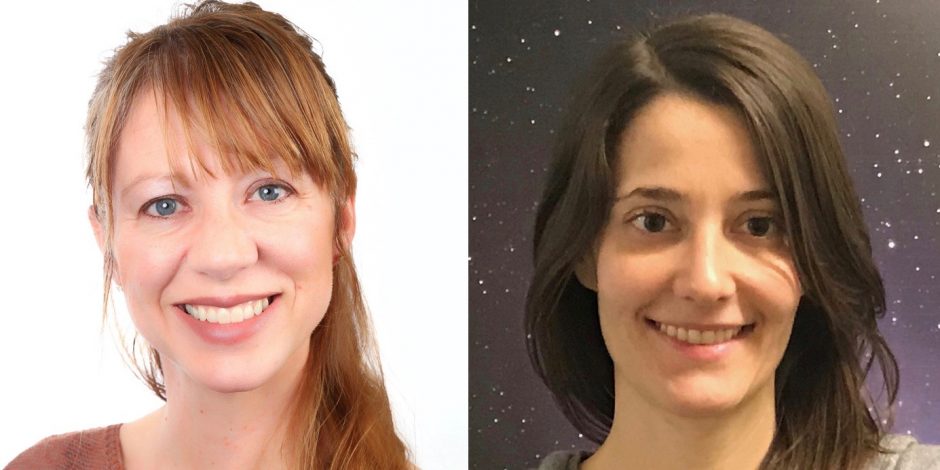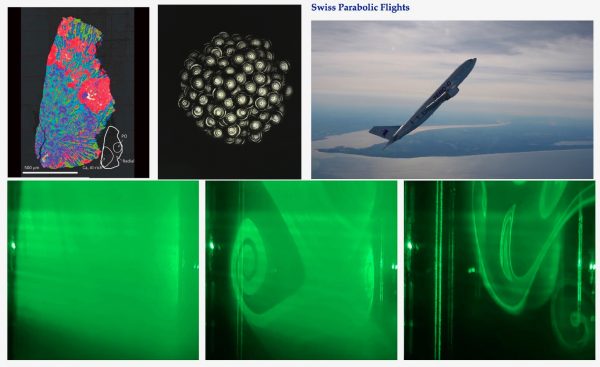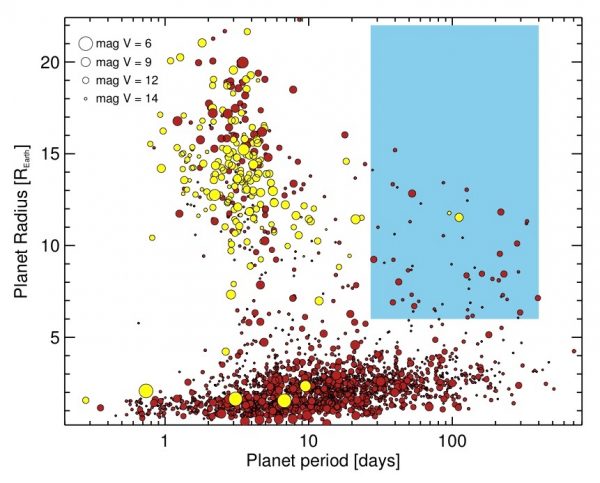New initiatives

The NCCR PlanetS Board at its meeting on Friday November 8, 2019 has decided to attribute CHF 350’000 to two new initiatives. Holly Capelo and Monika Lendl describe what the new projects are about.

TEMPus VoLA: Granular two-phase flow phenomena tested during parabolic flights. Below: Onset of fluid instability imaged with PIV.
TEMPus VoLA: The Timed Epstein Multi-Pressure-Vessel at Low Accelerations from Holly L. Capelo UBE, Jean-David Bodénan ETHZ/UZH, Clement Surville UZH, Jonas Guillaume Kühn UBE, Martin Jutzi UBE, Maria Schönbächler ETHZ, Antoine Pommerol UBE, Lucio Mayer UZH, Nick Thomas UBE
By Holly Capelo
The acronym “Tempus Vola” is descriptive. This is a project to conduct experiments involving dust-laden fluids, under microgravity conditions, with a range of gas pressures so low, that the ‘Epstein’ drag law applies. We will perform the experiments on an airplane executing parabolas in order to enter into and out of micro-gravity, and so the timing of the measurements during the flight is critical.
The processes we explore are important for planetesimal formation and evolution, which involve the interaction with dust grains with each other and with gas through drag forces. We want to know how the presence of the dust changes the properties — such as the tendency to become turbulent — of the fluid itself. The overall vision is to use the experiments to reconcile classical physical principles, which have mostly been tested under Earth-like flow conditions, with modern astrophysical theory and simulations. We are also trying to push boundaries in experimental astrophysics by choosing our dust analogue materials to be consistent with the cosmochemical record.
For these reasons, together with the technically demanding aspects of the project, we require a diverse team of experimental and theoretical astrophysicists, cosmochemists, and engineers.
I chose the name because it evokes the Latin ‘Tempus Volat’. It is a reminder that there is a short lifespan for this initiative, which is scheduled to fly in summer 2020. Even more so, they say that ‘time flies when you are having fun’, and this project certainly will be just that.
The PlanetS mono transit initiative from Monika Lendel UGE and Christoph Mordasini UBE
By Monika Lendl
Long-period planets hold a wealth of information that allows us to better understand the fundamental processes of how planets form and how they evolve with time. Unlike planets at orbital periods of only a few days, cool planets still possess most of the characteristics they were born with: their atmospheres have not been eroded through extreme irradiation, their structure is not modified by the intense one-sided irradiation, and their orbits have not been altered due to tidal interactions with their host star. Not only that, but these planets exist in temperature ranges closer to those of the planets we have had the privilege to study in-situ: those of the Solar system.
The TESS survey has been monitoring bright stars across nearly the entire sky in the search for transiting planets orbiting bright, well-observable stars. Its large spatial coverage however comes with a disadvantage: a limited time coverage, in most cases no more than 27 days. This short temporal coverage directly imposes a limit on the maximum planetary period which can be reliably measured by observing two individual transit events. Still, a number of long-period planets will reveal themselves in TESS data by creating single transit events. These “Monotransits” allow only very crude constrains on the planetary period, and are also prone being confused with instrumental effects, or effects of non-planetary origin. Yet, Monotransits on bright stars are signposts of extremely valuable planets: cool, well-characterisable planets.
The Monotransit Initiative has been created to take up the challenge of chasing these objects observationally, derive their precise properties and use them to better understand their nature, and as a consequence the process of theirformation. To do so, we combine the core expertises of the PlanetS teams at the Universities of Geneva and Bern: planet discovery and numerical modelling of planet formation and evolution.
Categories: Internal Newsletter, Uncategorized


